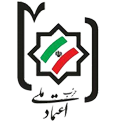National Trust Party (Iran)
National Trust Party | |
|---|---|
 | |
| Secretary-General | Elias Hazrati |
| Spokesperson | Esmaeil Gerami-Moghaddam[1] |
| Founder | Mehdi Karroubi |
| Legalized | 13 August 2005[2] |
| Headquarters | Tehran, Iran |
| Newspaper | Etemad-e Melli[3] |
| Ideology | |
| Electoral alliance |
|
| Tehran City Council | 3 / 21 |
| Isfahan City Council | 1 / 13 |
| Shiraz City Council | 1 / 13 |
| Website | |
| etemad-melli | |
National Trust Party (Persian: حزب اعتماد ملی, romanized: Ḥezb-e Eʿtemād-e Mellī, also translated as National Confidence Party)[5][6][7] is an Iranian political party based on a reformist and populist message.[8]
It was established in 2005 by former Parliament speaker Mehdi Karroubi following his defeat in 2005 presidential election.[9] National Trust Party cooperates with the Reformists' Supreme Council for Policymaking.[10]
Platform
The party has opposed dictating the state religion in Iran and called for an amendment for the constitution of Iran that would limit the absolute power of the supreme leader, while endorsing Guardianship of the Islamic Jurist.[5] In foreign policy, it wants détente with the United States.[11] The party regards itself as being committed to the political thought and legacy of Ruhollah Khomeini.[12]
Writing in Iranian Studies, Kaveh-Cyrus Sanandaji states that the party projects a more moderate-reformist platform than the mainstream reformist current associated with Mohammad Khatami, given that it purportedly "does not question the Islamic character of the regime".[13] According to Muhammad Sahimi, the party has tried to attract the disaffected reformists who are not happy with the Participation Front, Mojahedin, or the Executives of Construction and "is more like a moderate right-wing party than a true reformist/democratic organization".[9]
Members
Party leaders
| Name | Tenure | Ref |
|---|---|---|
| Mehdi Karoubi | 2005–2021 | |
| Elias Hazrati | 2021– |
| Name | Tenure | Ref |
|---|---|---|
| Rasoul Montajabnia | 2005–2018 | |
| Elias Hazrati | 2018–2021 | |
| TBA |
Current officeholders
- Cabinet
- Masoud Soltanifar, Minister of Youth and Sports
References
- ^ "Iran Clamps Down On Opposition Leaders". AP. CBSNews. 17 July 2012. Retrieved 14 February 2011.
- ^ Bill Samii (1 September 2005), Iran: Political System Undergoes Major Changes, Radio Free Europe/Radio Liberty, retrieved 15 May 2017
- ^ VOA News (August 17, 2009). "Iranian Police Clash With Protesters Over Banned Newspaper". Voice of America. Archived from the original on August 19, 2009.
- ^ a b Khani, Mohamamd Hassan (17 July 2012). "Political Parties in the Islamic Republic of Iran". Iran Review. Retrieved 1 April 2016.
- ^ a b Gunes Murat Tezcur (2010). Muslim Reformers in Iran and Turkey: The Paradox of Moderation. The University of Texas Press. pp. 120, 202–203. ISBN 978-0-292-72197-5.
- ^ "Political Factions Competing in Iran's Parliamentary Elections". The Jerusalem Post. 14 March 2008. Retrieved 1 March 2017.
- ^ Razavi, Reza (2010), "The Road to Party Politics in Iran (1979–2009)", Middle Eastern Studies, 46 (1): 79–96, doi:10.1080/00263200903432274, ISSN 1743-7881, S2CID 144106165
- ^ Kaveh-Cyrus Sanandaji (Middle East Center, St. Antony's College, University of Oxford) (April 24, 2009). "What Reformists Can Learn From Past Failures". National Democratic Institute.
Karroubi continues to expound a populist message
{{cite web}}: CS1 maint: multiple names: authors list (link) - ^ a b Muhammad Sahimi (12 May 2009). "The Political Groups". Tehran Bureau. Retrieved 21 August 2015.
- ^ Caitlin Shayda Pendleton (23 September 2016), "Iran 2017 Presidential Election Tracker", AEI’s Critical Threats Project, retrieved 5 May 2017
- ^ Asayesh, Hossein; Halim, Adlina Ab.; Jawan, Jayum A.; Shojaei, Seyedeh Nosrat (March 2011). "Political Party in Islamic Republic of Iran: A Review". Journal of Politics and Law. 4 (1). Canadian Center of Science and Education: 221–230. doi:10.5539/jpl.v4n1p221. ISSN 1913-9047.
- ^ "National Trust (E'temād-e Mellī)" (PDF). Iran Data Portal. Syracuse University. 15 June 2011. Retrieved 10 May 2017.
- ^ Kaveh-Cyrus Sanandaji (2009), "The Eighth Majles Elections in the Islamic Republic of Iran: A Division in Conservative Ranks and the Politics of Moderation", Iranian Studies, 42 (4), Routledge: 621–648, doi:10.1080/00210860903106345, S2CID 153397356
External links
